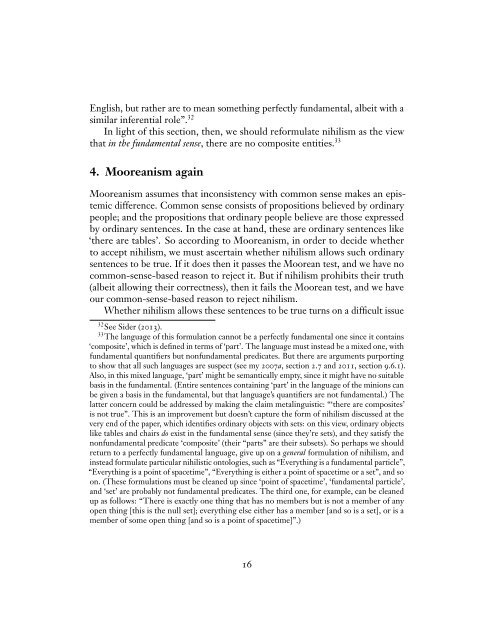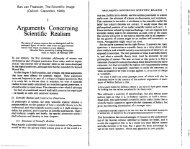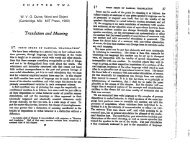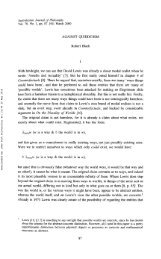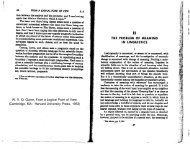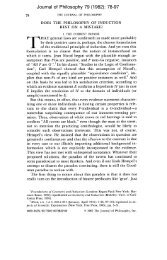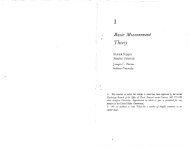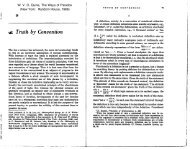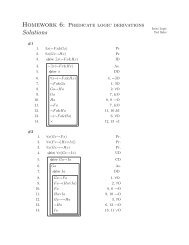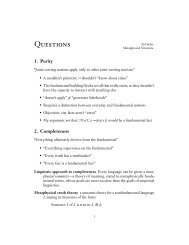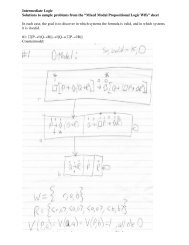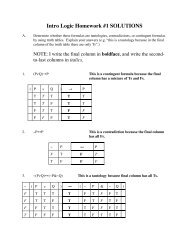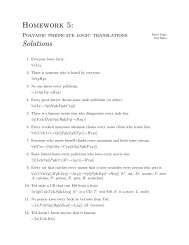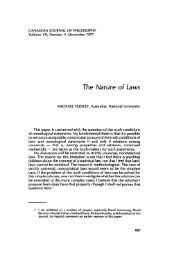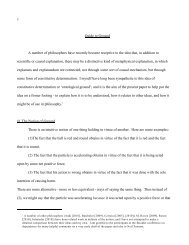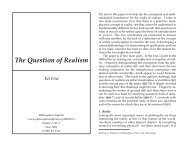Against Parthood∗ - Ted Sider
Against Parthood∗ - Ted Sider
Against Parthood∗ - Ted Sider
Create successful ePaper yourself
Turn your PDF publications into a flip-book with our unique Google optimized e-Paper software.
English, but rather are to mean something perfectly fundamental, albeit with a<br />
similar inferential role”. 32<br />
In light of this section, then, we should reformulate nihilism as the view<br />
that in the fundamental sense, there are no composite entities. 33<br />
4. Mooreanism again<br />
Mooreanism assumes that inconsistency with common sense makes an epistemic<br />
difference. Common sense consists of propositions believed by ordinary<br />
people; and the propositions that ordinary people believe are those expressed<br />
by ordinary sentences. In the case at hand, these are ordinary sentences like<br />
‘there are tables’. So according to Mooreanism, in order to decide whether<br />
to accept nihilism, we must ascertain whether nihilism allows such ordinary<br />
sentences to be true. If it does then it passes the Moorean test, and we have no<br />
common-sense-based reason to reject it. But if nihilism prohibits their truth<br />
(albeit allowing their correctness), then it fails the Moorean test, and we have<br />
our common-sense-based reason to reject nihilism.<br />
Whether nihilism allows these sentences to be true turns on a difficult issue<br />
32 See <strong>Sider</strong> (2013).<br />
33 The language of this formulation cannot be a perfectly fundamental one since it contains<br />
‘composite’, which is defined in terms of ‘part’. The language must instead be a mixed one, with<br />
fundamental quantifiers but nonfundamental predicates. But there are arguments purporting<br />
to show that all such languages are suspect (see my 2007a, section 2.7 and 2011, section 9.6.1).<br />
Also, in this mixed language, ‘part’ might be semantically empty, since it might have no suitable<br />
basis in the fundamental. (Entire sentences containing ‘part’ in the language of the minions can<br />
be given a basis in the fundamental, but that language’s quantifiers are not fundamental.) The<br />
latter concern could be addressed by making the claim metalinguistic: “‘there are composites’<br />
is not true”. This is an improvement but doesn’t capture the form of nihilism discussed at the<br />
very end of the paper, which identifies ordinary objects with sets: on this view, ordinary objects<br />
like tables and chairs do exist in the fundamental sense (since they’re sets), and they satisfy the<br />
nonfundamental predicate ‘composite’ (their “parts” are their subsets). So perhaps we should<br />
return to a perfectly fundamental language, give up on a general formulation of nihilism, and<br />
instead formulate particular nihilistic ontologies, such as “Everything is a fundamental particle”,<br />
“Everything is a point of spacetime”, “Everything is either a point of spacetime or a set”, and so<br />
on. (These formulations must be cleaned up since ‘point of spacetime’, ‘fundamental particle’,<br />
and ‘set’ are probably not fundamental predicates. The third one, for example, can be cleaned<br />
up as follows: “There is exactly one thing that has no members but is not a member of any<br />
open thing [this is the null set]; everything else either has a member [and so is a set], or is a<br />
member of some open thing [and so is a point of spacetime]”.)<br />
16


